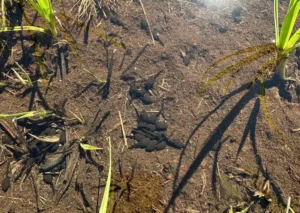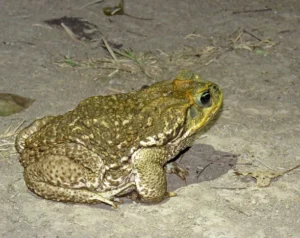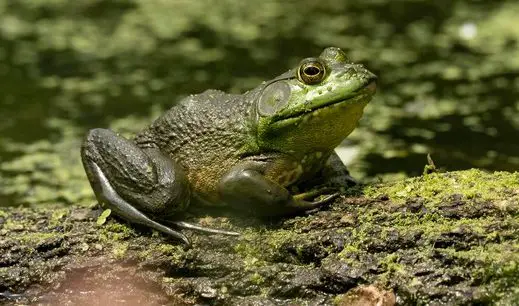Frogs are aggressive predators that aren’t picky with what they eat. Different frog species can eat slightly different things, mainly based on their size and the environment they live. But do frogs eat other frogs?
Large frog species such as bullfrogs or cane toads are known to eat smaller frog species. Even smaller frogs such as the Cuban tree frog often eat smaller frogs.
The tadpoles of many frog species are also known to occasionally eat smaller tadpoles, even of their own species.
They usually do this when they are in crowded pools where they have to compete for space and other limited resources.
Tadpoles Eat Other Tadpoles
The tadpoles of many frogs and toad species have been known to eat smaller, vulnerable tadpoles. They usually do this when they are in crowded pools where they have to compete for space and other limited resources.
Eating smaller tadpoles allows large tadpoles to eliminate some of their competitors, and improve the chances of their own survival.
To test out tadpole cannibalism, a researcher by the name of Dale Jefferson of the University of Saskatchewan in Canada, studied captive wood frog tadpoles.

In the experiment, he tried feeding lone tadpoles a diet of ground-up tadpoles, but they refused to eat it until they were nearly starving.
However, when the tadpoles were kept in dense groups, it was found that they readily ate ground-up tadpoles.
Still, it was found that cannibal tadpoles did not grow as fast as tadpoles that were fed a mixture of brine shrimp, suggesting that the cannibal diet was not the most ideal.
This experiment demonstrates that wood frog tadpoles will not eat other tadpoles unless they are starving or competing with each other for resources.
Eating each other does not provide the best diet, but it helps eliminate competition for resources.
Large Frogs Eat Smaller Frogs
Frogs are opportunistic predators with very diverse diets. Smaller frogs mostly eat small worms and a wide variety of bugs, but large frogs such as bullfrogs will also eat smaller amphibians, small lizards, birds, and many other small animals.
If the prey is slow enough to catch and small enough to fit into the mouth, it is on the menu – and other frogs are not off limits.
American and African bullfrogs have been extensively documented eating smaller frogs, including those of their own species.
African clawed frogs are also known to readily gobble up smaller frogs, sometimes even their own offspring.
Northern leopard frogs have also been documented eating smaller frogs.
Large frog species such as bullfrogs and cane toads are more likely to cannibalize smaller frogs because their large size enables them to overpower and swallow adult frogs of many other species.

However, even some smaller frogs are known to eat other frogs.
Invasive Cuban tree frogs in Florida have been extensively documented eating several of Florida’s native frogs, and are thought to be responsible for the decline of some native tree frog species, especially in urbanized areas.
How Do Frogs Eat Other Frogs?
Frogs catch and eat other frogs the same way they eat other prey. They have sticky tongues that allow them to catch any moving prey that comes into range quickly.
Once a frog spots a small enough frog, it launches its tongue to catch the prey. After catching the prey, the tongue wraps around it and coats it with sticky saliva. The frog will then yank its tongue back with a force equal to twelve times greater than the force of gravity.
Once the prey is in the mouth, the frog will swallow it whole (although frogs have teeth, they do not use them to chew, but rather to maintain a grip on their prey as they swallow it whole).
A frog can shoot out its tongue, capture prey, and pull it back into its mouth within 07 seconds; which is five times faster than the human eye can blink. This speed makes it effective at catching even fast-flying insects such as flies.
Frogs eat other frogs that are too large to be captured using only the tongue, they lunge at them instead and bite down to maintain a firm grip.
They then use their front legs to grasp and push the prey into their mouths.
Do Frogs Eat Dead Frogs?
Frogs are instinctively attracted to movement while hunting for food. For this reason, most frogs will ignore dead frogs.
Many insects use playing dead as a way to avoid predators, including frogs. Some insects stop moving and stay perfectly still to prevent frogs from eating them.
However, toads such as the Cane toad, which are known to eat carrion (dead animals), will readily eat dead frogs they can find.
Conclusion
Frogs are very opportunistic predators. Large frogs such as bullfrogs will sometimes eat smaller frogs, especially when other food sources are scarce.
Smaller frogs do not typically eat other frogs, but they may also engage in cannibalism under some circumstances.

